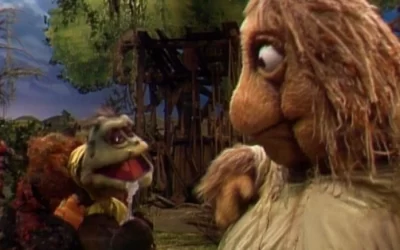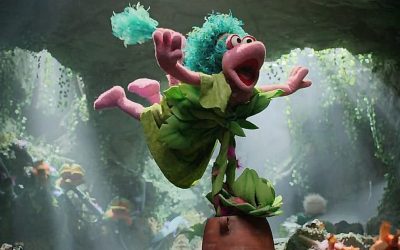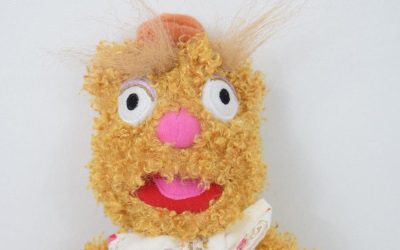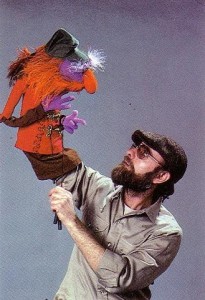 It’s obvious, really, when you think about what we call him.
It’s obvious, really, when you think about what we call him.
When “The Muppet Show” was at its height, we read everything we could about the performers and producers — the magazine articles, the books, and the back covers of record albums. We learned all the names, and we could rattle them all off from memory.
There was Henson, and Oz, and Goelz, and Hunt, and Juhl, and Frith, and… Jerry.
Maybe you would say “Jerry Nelson”, just to clarify that you’re not talking about Jerry Juhl, but you wouldn’t say “Nelson”. As I’m writing this, I haven’t read any of the other tributes that people have written yet — but I bet there aren’t many people calling him “Nelson”. It just doesn’t sound right. He’s Jerry.
Now, maybe that’s because it’s a more common last name than the others, or because “Nelson” sounds like a first name anyway. But I think there’s something else.
Back in those magical “Muppet Show” days, when the whole world dreamed of going behind the scenes, everybody knew Jim Henson and Frank Oz; we knew that Bert and Grover and Fozzie and Yoda were all different aspects of the same voice. We knew the story of Dave Goelz, and how Gonzo developed from a background character into a soulful dreamer.
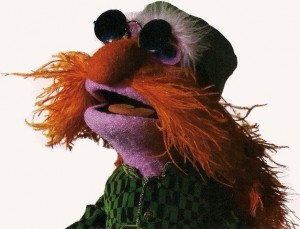 But nobody really talked about Jerry. On “The Muppet Show”, his signature character was Floyd Pepper, a laid-back hepcat who always seemed to play the straight-man role to the wilder characters, holding Animal’s chain or chuckling at Gonzo’s latest disaster. On “Sesame Street”, the clumsy, loud Herry Monster always seemed most at home when he talking to the kids, listening to them and letting them have the funny lines.
But nobody really talked about Jerry. On “The Muppet Show”, his signature character was Floyd Pepper, a laid-back hepcat who always seemed to play the straight-man role to the wilder characters, holding Animal’s chain or chuckling at Gonzo’s latest disaster. On “Sesame Street”, the clumsy, loud Herry Monster always seemed most at home when he talking to the kids, listening to them and letting them have the funny lines.
Jerry wasn’t a movie star, the way that Henson and Oz always were, and the way that Goelz grew into over time. Jerry was a character actor. He did his best work when he could slip into a character, and just live in there.
Here’s a quote from a 1992 live panel discussion at the Museum of Television and Radio. Jerry’s just been asked to talk about Floyd, and he only gets a few sentences into his answer when he decides to bring the puppet out of a bag and demonstrate.
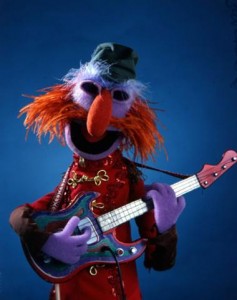 Jerry says, “I always thought of Floyd as a character who had probably been a beatnik first, and then he was into jazz and poetry, and then he probably went along with the chase into rock and roll, because he needed a job… When I think about a jazz player, I think of somebody who enjoys life fully, is sort of on the outside of everything. Jazz was kind of an outside music which wasn’t totally accepted, even though it’s a purely American form of music.”
Jerry says, “I always thought of Floyd as a character who had probably been a beatnik first, and then he was into jazz and poetry, and then he probably went along with the chase into rock and roll, because he needed a job… When I think about a jazz player, I think of somebody who enjoys life fully, is sort of on the outside of everything. Jazz was kind of an outside music which wasn’t totally accepted, even though it’s a purely American form of music.”
Floyd nods: “Yeah.”
Jerry: “Jim covered all the bases in music too, but he was aware — that was a time when all of that kind of language was happening. The outside edges were getting into cool and things like that. I always thought of Floyd as kind of trucking when he walked, you know? ‘Cause of that 60s thing.”
Floyd: “Mr. Natural.”
Jerry: “But really, we have to thank the people who build these puppets, who draw them and build them. Because when I look at him, I see something, and I just kind of let what happens happen.”
And that’s how it worked for Jerry. That second moment with Floyd — the puppet is correcting Jerry, reminding him of a name that he’s forgotten. Floyd is completely real in that moment. He has a history which grew out of Jerry’s own experiences and interests, and then he took on a life of his own.
That’s what happens, when you let what happens happen.
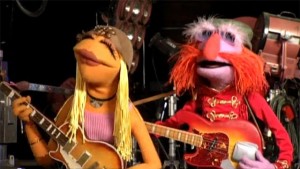
Click here to be what’s happening on the ToughPigs forum!
by Danny Horn

